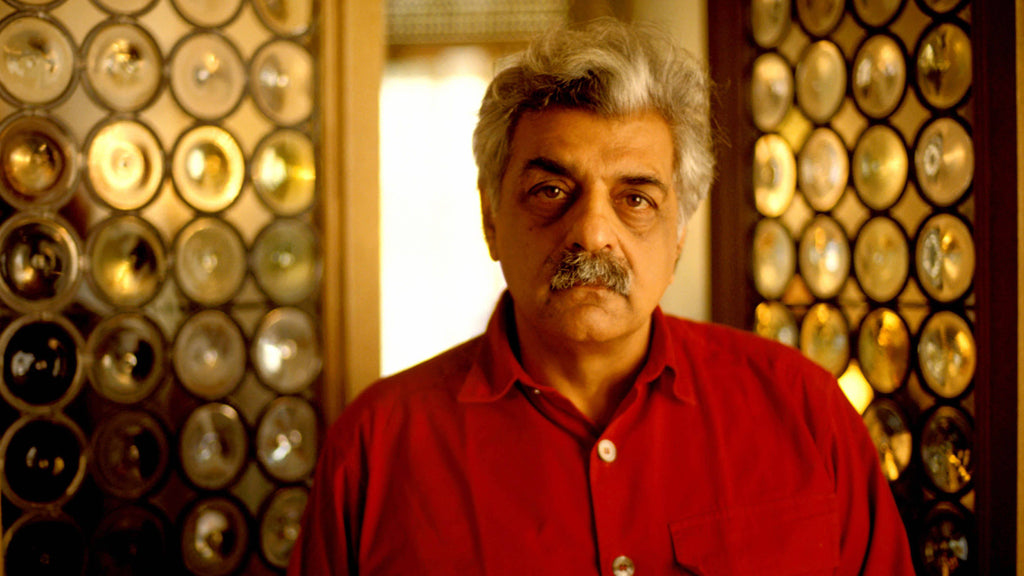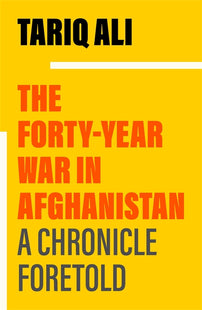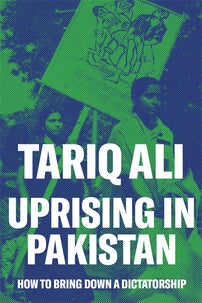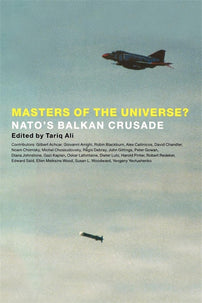'So, Was It Worth It?' - An extract from Tariq Ali's 'The Forty Year War in Afghanistan'
Shortly after the US invasion of Afghanistan, Tariq Ali exchanged a series of letters with Mike O'Brien, the UK Minister of Trade. The correspondence is a fascinating window into the imperial fantasies of the New Labour government in the early days of that doomed adventure.

**NB: The following is an extract from Tariq Ali's new book The Forty Year War in Afghanistan, out today from Verso Books.
An Exchange with Mike O'Brien,
UK Minister for Trade, Investment and Foreign Affairs
Dear Mike,
The difference between Britain and Afghanistan, of course, is that in Afghanistan there is a strong opposition. Karzai is so confident of his popularity in Kabul (his writ does not extend beyond the capital) that no Afghan is permitted to guard him. Elsewhere the various factions of the Northern Alliance and remnants of the Taliban control the country.
The aim of the war and occupation was to capture and kill Osama bin Laden and Mullah Omar and shackle al-Qaida. The result has been a dismal failure. The video earlier this year of Osama and his deputy wearing their Chitrali hats and strolling cheerfully in the Hindukush was a cheeky reminder that on this front the war has been a dismal failure.
Removing the Taliban from power was always a secondary aim. The condition of the population is certainly not better today than before the war. The reconstruction has turned out to be a joke. The women’s liberation talked about so eagerly at the time by the first ladies of Bush and Blair has come to nought. More money is being spent on feeding and housing Western troops than on the war-weary citizens of Afghanistan. And it will end badly, just like the Soviet intervention did in the 80s. I fear another civil war is waiting in the wings.
Yours, Tariq
Dear Tariq,
So scathing, so cynical, so wrong. When I drove through the suburbs of western Kabul, every building I passed had been damaged by 20 years of civil war. You impressively described those wars in your book, The Clash of Fundamentalisms.
But I saw a lot of people in those derelict homes making bricks and rebuilding. They were building because they had hope that the future could be better. I talked to people who were so glad that the Taliban were gone that they had tears in their eyes; women who no longer had to wear the burqa and who could send their daughters to school. I went to a school for the blind to present the children with some braille machines because the Taliban had destroyed them all. ‘Failure’, you say. It’s not what they say.
Those who opposed intervention in Afghanistan would have denied hope to these people. But you are right on one thing. There are still mega-problems. There are drug warlords and poverty and injustice. There are terrorist incidents. The government needs the ability to better enforce its writ outside Kabul.
Yes, it will take years to sort out the mess created over decades. But there is today a hope that defies any hard-bitten cynicism. Those people impressed me with their determination to rebuild. Karzai is an ordinary man trying to do an extraordinary thing, to create a democracy from devastation. There are no guarantees that he will succeed, but we should do all we can to help. The UN and the world have not turned their back. There is a lot of money going in there. Rebuilding will be hard and will take time, but it is worth it.
Best wishes, Mike
Dear Mike,
You sound like a Pravda man I argued with in the early 1980s. He too accused me of cynicism when I denounced the Soviet intervention as something that would end badly. In reality the Russians did push through an effective modernisation in the towns that provided an educational system for all (including women), and the number of women working in schools and hospitals multiplied rapidly. That was the time when Reagan and Thatcher welcomed the bearded mujahideen and introduced them to the western media as ‘the equivalent of our founding Fathers’. They certainly were the founding fathers of the Taliban.
I doubt whether the current bunch can do anything that remotely resembles the Soviet modernisation. How can western regimes busy dismantling the welfare state and privatising everything at home create a social democratic paradise in Afghanistan?
The burqa is back in business, I’m afraid, enforced by the men who rule the country with Washington’s blessing. Human Rights Watch has spoken to women who said they veiled themselves to avoid violence and harassment. Add to that the fact that ministers are busy demolishing homes (possibly not the ones you visited) to grab land, and that senior Afghan military commanders and officials are involved in corruption and violence on a daily basis. This is reality for the majority of Afghans.
There has been little reconstruction. Very little of the $4.5bn (£2.7bn) pledged in Tokyo in 2002 – a pittance even then – has come through. The World Bank estimates that a minimum of $13bn is needed to reconstruct the country. It was no problem finding $11bn to fight the war and occupy the country, but it’s virtually impossible to raise funds to repair the infrastructure. This is the pattern of all the recent wars. In most cases foreign interventions create more problems than they can solve. The western states act usually to defend their own interests.
As for poor Hamid Karzai, he is a longtime worker for the US intelligence agencies, like his friend Zalmay Khalilzad who put him there. But he seems to represent nobody inside Afghanistan. I fear he might be bumped off despite the all-American bodyguard.
There are two choices. Either he could be put on a Paris catwalk to model shawls, or the Dear Leader could find him a safe New Labour constituency. It would be mean-spirited, having used him as a filter, to let the brutes of the Northern Alliance flush him down.
Yours, Tariq
Dear Tariq
I doubt that many Afghans would share your charitable view of Soviet occupation. But let’s not let political prejudice get in the way of the facts, eh? $4.5bn was pledged at Tokyo but you missed out that it was pledged over 5 years, not all in one year. Much of that money is now flowing and will continue over the next five years.
Schools have opened, hospitals operate and a road is to be built from Kabul to Jalalabad. Some $1.8bn in foreign aid was spent last year and the UK alone provided £45.5m at the start of last year. We are committed to spending £322m over five years – £122 million more than we pledged at Tokyo.
Okay, so all this will not create a social democratic paradise. I think Afghans, like the rest of us, are prepared to wait for paradise if they could get peace and a reasonable standard of living now. And things are not as bleak as you portray. Four million children are now back at school, 37% of them are girls and the numbers are rising; eight million children have been vaccinated against measles, preventing 30,000 deaths; over six million children have been immunised against polio; and more than two million refugees have voted with their feet and returned to Afghanistan because they now have hope. In addition, more than 400,000 internally displaced persons have also been able to return home.
Not paradise, but Hamid Karzai will not have to go looking for a New Labour constituency. He will have a few remarkable achievements to put before his own people in the presidential election due in 2004.
Best wishes, Mike O’Brien
Dear Mike,
My only point about the Soviet occupation was that, like Washington, they believed their modernising reforms would do the trick. Now the arguments you deploy are virtually the same. The difference is that the Russians did achieve much more. Incidentally, the figures you supply are already being challenged by all sides. Many refugees who went back have returned to Pakistan. Law and order does not exist, not even in parts of Kabul.
The barons of the Northern Alliance control the country and are biding their time. That’s why I would urge you again to get Karzai out while you can. He would make a good politician in this country and surely Hartlepool beckons...
The imposition of a puppet regime, propped up by Nato troops, thousands of miles away from base, is untenable. It might have helped to build the image of the Dear Leader as a War Leader (‘... grave, not grandiloquent... sincerely moved... this emotional fluency is wonderful gift in politics, especially at times of war’, gushed Philip Stephens in the Financial Times). But no amount of cluster-bombs and daisy-cutters can solve the problem.
Very few Afghans support this occupation. Sooner or later you’ll have to pull out the Marines. Then what? A Northern Alliance bid for power and a new forward thrust by the Pakistan army. This time their boys will be clean-shaven and attired in modern dress. It could go down well on the networks and Fox TV. The modern soldiers of our closest ally sweeping the bearded men of the Northern Alliance out of the way and retaking Kabul. It could happen.
I hope, Mike, that you will soon emerge as the leader of the anti-war faction in New Labour, but beware the Hoon example. He, too, was once a junior minister at the Foreign Office and prone to wild exaggerations. In reality, and I’m quite serious, I think you should resign from the government and use your talents to win the party over for the future. New Labour will probably win the next election, but it has already lost the argument.
Best, Tariq
Dear Tariq
Thanks for your email and your solicitations for my future. I will stick with this government and this government will stick by the Afghans in reconstructing their country.
You attack my figures with vague references to challenges from ‘all sides’. Name them, I say! You use the fact – which I readily agree with – that there are problems in security. But to suggest what? That we should leave Afghans to another civil war? Perhaps we are the anti-war faction in Afghanistan now.
Like Private Fraser in Dad’s Army you seem to say: "We’re all doomed!" I accept that we need to tackle the security problem. Some 300 British troops are doing just that, alongside Germans, Canadians and others. Provincial reconstruction teams have recently been established to address the problems of the warlords. For the first time in 23 years there is an Afghan government and an army which is representative of all Afghans. We must continue this work.
And it is not just idealism. 90% of the heroin in Britain originates in Afghanistan. The security problem means opium production will go up before it comes down, but if we stick with it and eliminate poppy growth by 2013 we will have helped both Afghanistan and Britain. We are funding the Afghans to produce sustainable crops to eat and sell instead of poppies. We cannot create paradise there but we can help reduce the suffering.
By the way, if the Afghans don’t want Karzai – the current choice of their traditional parliament, the Loya Jirga – then in 2004 they can vote him out. Votes, not bullets, I say!
Best wishes, Mike O’Brien
Dear Mike,
It will not work. First, because there is no representative government (even in the broadest sense of the term) in the country. And I would urge you not to treat the Loya Jirga as anything but a collection of tribal leaders who are bought in the open market.
The Foreign Office where you sit has all the documentation. The British empire played the same tricks for over a century. The fact that your chum Karzai is a puppet of Washington is hardly a secret.
The 2004 ‘elections’ will be just like the ones the British empire pushed through in Iraq during the early colonial period. What that produced according to a subsequent British intelligence assessment was ‘an oligarchy of racketeers’.
Idealism, my dear Mike, has nothing to do with any of this. The Afghan adventure was a crude war of revenge. The fact that Europeans are involved doesn’t make it any better. If New Labour intends new colonisations then these should be openly discussed and argued. They didn’t work before. Why should they now?
As for the figures, just look at the Human Right Watch reports on refugees and women. They are lying on my desk in London and I’m sending this last one from New York. Or follow the time-honoured Downing Street method: type out Google.com, write ‘Afghan Refugees’ and then see what hits the fan.
On the crucial question of your own future and that of Karzai, let’s continue to talk. I am concerned.
Best, Tariq
Dear Tariq,
You present no alternative policy, merely rhetorical fireworks, sparkling but fleeting. As a minister I have to work out how Britain can help the Afghans to reconstruct their country.
The era of colonialism is dead and any western leader who does not realise this is a fool. The west cannot run Afghanistan but we must empower the Afghans to run it for themselves, then we must get our troops out. Our best long-term guarantee is a genuine democracy in Afghanistan.
Yes, the Loya Jirga wasn’t perfect but it was the best we could do at the time. Next year’s election will be better. The measure is whether things are improving, not whether they are perfect.
At least we are looking to give the Afghans all the help they need. Tony Blair promises it and we are delivering. The figures I quoted are real British taxpayers’ money flowing to help the Afghans.
The difference remains that my responsibility as a minister is to deliver, while your responsibility as a writer is to criticise. My record will be measured in the improvements in the lives of Afghans, yours in influencing public opinion about Labour.
I still believe government driven by idealism can do good things, you don’t. So I will get on with helping the Afghans and you will keep on knocking our policy. Even so, I enjoyed our exchange – a bit of healthy criticism can improve ministerial performance!
Best Wishes, Mike
Guardian, 11 October 2003










